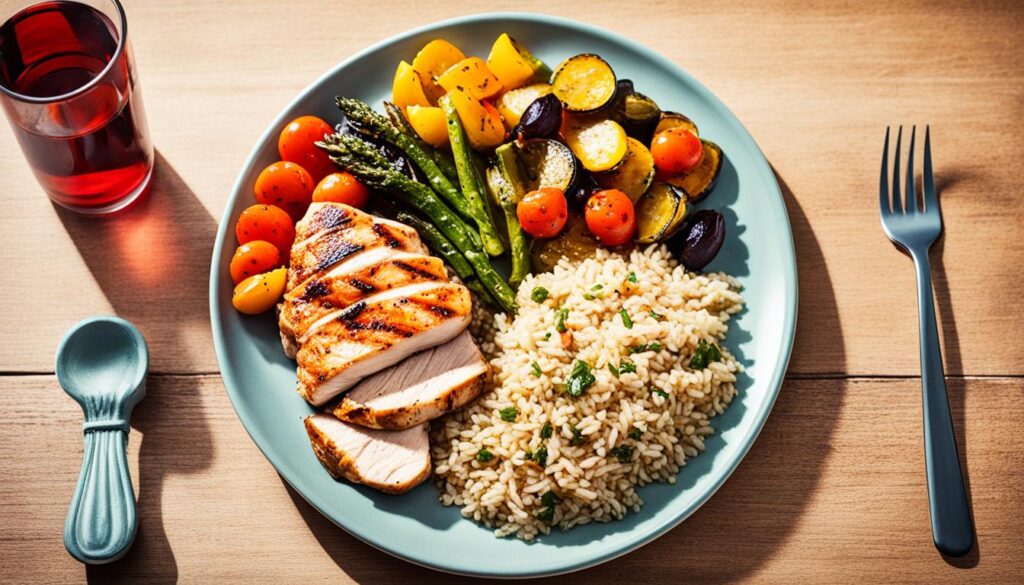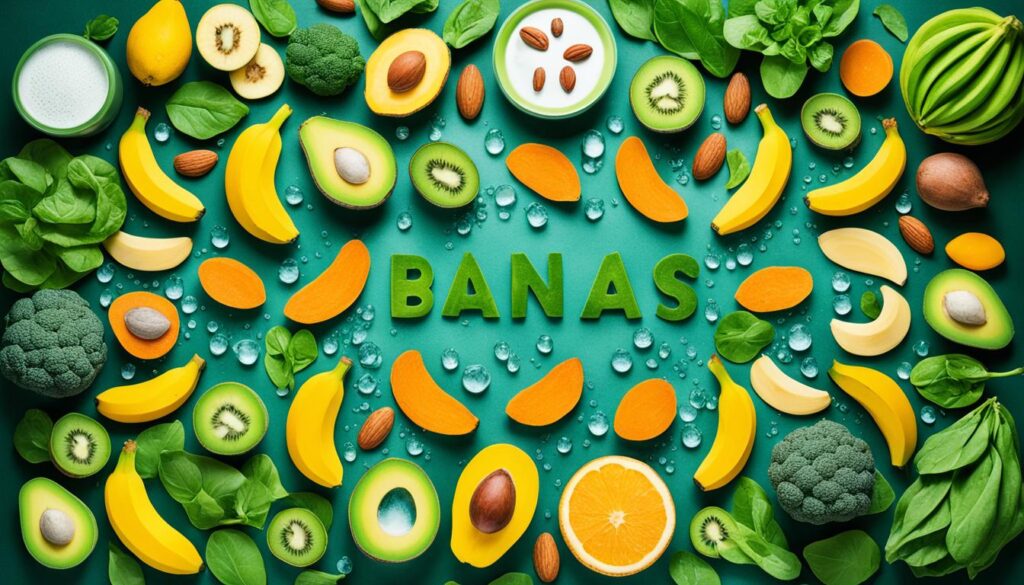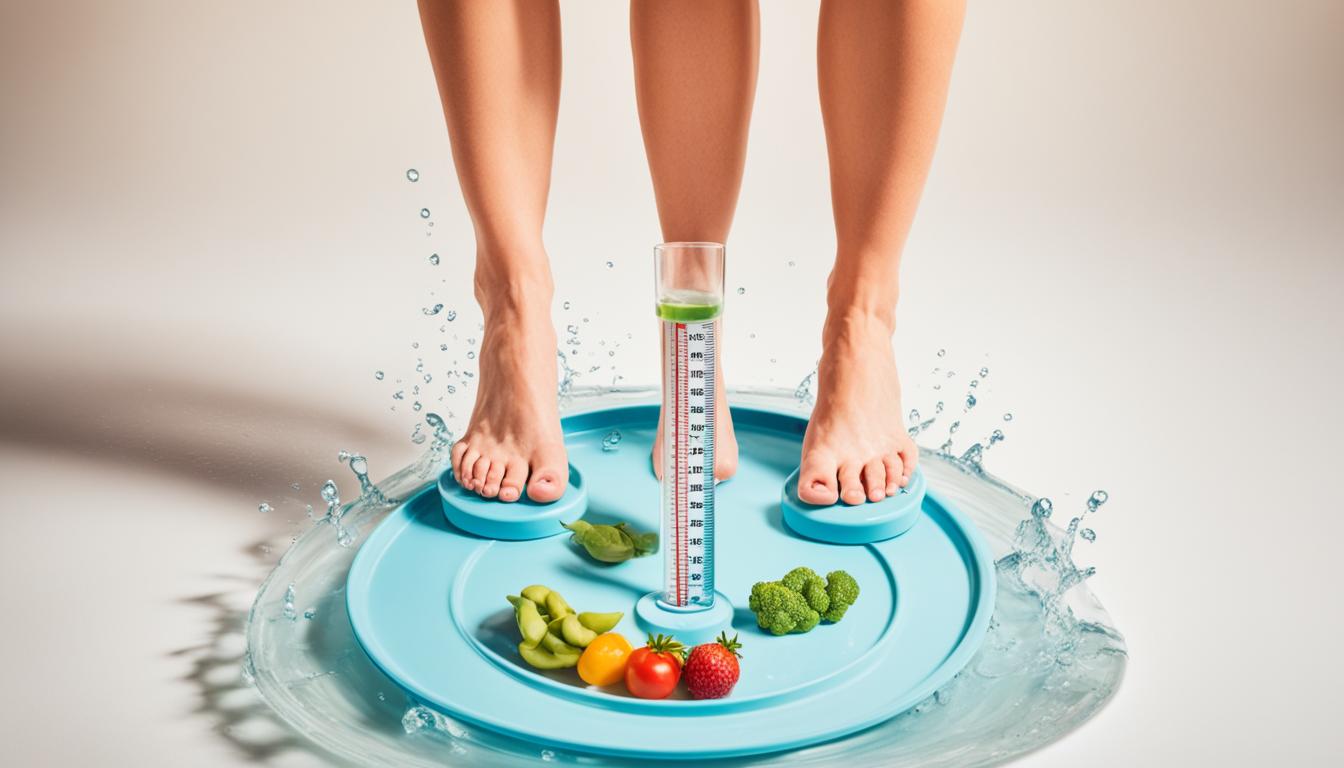Have you ever felt bloated, swollen, or saw your weight change fast? These are signs of water retention, or edema. Normally, adults’ bodies are 50 to 60 percent water. Yet too much can cause problems. Choosing the right foods can keep your body’s water balance in check.
Your diet is key in managing how much water your body holds. Eating too much salt and carbs can make you retain water. But, not enough potassium or magnesium can make it worse. A diet that’s low in sodium and carbs, but full of anti-inflammatory foods, can help. This kind of diet fights bloating and swelling.
This article will go more into why we retain water and how food affects it. We’ll talk about the importance of electrolytes and why foods high in potassium are good. Plus, we’ll see why adding magnesium can also be helpful. It’s a journey to learn how smart food choices can keep us healthy.
Understanding Water Retention and Its Causes
Water retention, known as edema, happens when the body keeps too much fluid. This can make people’s tissues swell up. Everyone has water in their body, but too much is called “water weight.” This can make you feel bloated.
What is Water Retention?
Water retention is when your body holds more water than it should. This extra water can gather in your feet, ankles, and hands. While not always a big worry, it can sometimes show there’s a health problem.
Common Causes of Water Retention
Several things can cause water retention. This includes how much salt you eat, hormonal changes, and not moving enough. Some medicines and health issues like heart disease can also lead to holding extra water.
If you see sudden or heavy swelling, especially with other signs like trouble breathing, it could be serious. In these cases, seeing a doctor is very important to find out why and get the right treatment.
The Role of Sodium in Water Retention
Sodium, from salt, is key for keeping our body’s fluids balanced. Too much, though, causes us to keep extra water and feel bloated. It’s important to know how sodium affects our fluids and find its hidden sources in our diet.
How Sodium Affects Fluid Balance
The body needs to balance sodium and water just right. Too much sodium means the body holds on to extra water. This can make you swell, feel bloated, and seem to gain weight. Americans are urged to limit sodium intake to 2,300 mg a day, yet many routinely consume over 3,400 mg.

Studies link too much salt with a higher chance of obesity, regardless of total calories. For example, more sodium was found to increase the risk of obesity by 28% for kids and 26% for adults. Eating more than 2,300 mg of sodium per day also increases obesity and belly fat risk.
Hidden Sources of Sodium in the Diet
While adding salt at the table is known, processed foods are a major, but less obvious, source. They contribute about 70% of the salt the average American eats. High-sodium foods include:
- Cheese and processed meats
- Bread and baked goods
- Frozen meals and canned soups
- Savory snacks and condiments
- Fast food, fried food, and pizzas
These foods are also often high in calories, which can lead to weight gain and keeping too much fluid. Managing your sodium intake means checking food labels and knowing the sodium in your food.
Tips for Reducing Sodium Intake
To cut back on sodium, try these tips:
- Choose fresh, whole foods over processed options
- Opt for low-sodium alternatives when available
- Use herbs, spices, and citrus to flavor meals instead of salt
- Cook at home more often to control sodium content
- Rinse canned vegetables and beans to remove excess sodium
| Sodium Intake Recommendations | Daily Limit |
|---|---|
| Dietary Guidelines for Americans | 2,300 mg |
| American Heart Association (ideal limit) | 1,500 mg |
Choosing a low-sodium diet with natural, whole foods like fruits and veggies will help balance your fluid and reduce water retention. Plus, drinking plenty of water every day can flush out extra sodium and help prevent keeping too much fluid.
Carbohydrates and Water Weight
Carbohydrates are key for energy, yet they also impact water retention. Eating carbs turns unused energy into glycogen. This is a storage type of glucose. For every gram of glycogen, the body also keeps 3 to 4 grams of water.
The Link Between Carbs and Glycogen Storage
It’s suggested to have 130 grams of carbohydrates daily for proper body function. But, many eat more carbs than needed. This leads to storing more glycogen and water.
For every gram of carbohydrate consumed, the body stores 3 to 4 grams of water.
High carb diets can make you hold up to 1.5 pounds of extra water. Too much sugar can spike your insulin, making you keep even more water.
How to Manage Carb Intake for Optimal Fluid Balance
Finding the right carb balance is crucial. Aim for 130 grams a day but avoid too much. Switch some carbs with high-protein foods like:
- Lean meats
- Eggs
- Soy products
- Legumes
- Low-fat dairy products
Adding more protein to your meals aids in reducing water weight from too many carbs. Also, go for complex carbs like whole grains and veggies. They give lasting energy with less effect on water retention.
| Macronutrient | Daily Recommended Intake | Effect on Water Retention |
|---|---|---|
| Carbohydrates | At least 130 grams | Excess intake can lead to increased glycogen storage and water retention |
| Protein | 0.8 grams per kilogram of body weight | Can help reduce water weight by replacing some daily sources of carbs |
| Fat | 20-35% of total daily calories | Does not directly impact water retention |
Understanding carbs and water weight helps. By controlling carb intake, you can balance your fluid levels. A balanced diet with many nutrients is best for health.
Potassium and Magnesium: Key Nutrients for Reducing Water Retention
Managing fluid retention and water weight is key. Two crucial nutrients for this are potassium and magnesium. They help balance the body’s fluids. This reduces the bloating, swelling, and discomfort water retention causes.

The Benefits of Potassium-Rich Foods
Keep high sodium effects in check with potassium. High sodium means the body keeps in more water. Potassium-rich foods counter this. Good sources are:
- Bananas
- Avocados
- Spinach and other leafy greens
- Sweet potatoes
- White beans
Not having enough potassium links to health issues. These include higher blood pressure and kidney stones. A good potassium diet helps in many ways, keeping you healthy.
Magnesium’s Role in Fluid Regulation
Magnesium helps the body handle water and sodium. Over 300 functions in the body involve magnesium. So, it’s vital for keeping fluids balanced.
For women with PMS, magnesium supplements help. A 250mg dose each day can lessen bloating. Vitamin B6 might also cut down on bloating for women with PMS.
Incorporating These Nutrients into Your Diet
To cut down on water retention, eat plenty of potassium and magnesium. Food sources are best. Here’s how to add these nutrients:
- Eat more fruits and veggies, rich in potassium, like bananas and avocados.
- Go for whole grains, which are higher in magnesium.
- Add nuts and seeds to your diet for potassium and magnesium.
- A good magnesium supplement can help, especially for PMS.
| Nutrient | Daily Recommended Intake | Food Sources |
|---|---|---|
| Potassium | 3,400 mg for adults | Bananas, avocados, spinach, sweet potatoes, white beans |
| Magnesium | 400-420 mg for men 310-320 mg for women |
Almonds, cashews, pumpkin seeds, spinach, black beans |
Eating more foods with potassium and magnesium is a smart way to tackle fluid retention. Talk to your doctor before adding new supplements to your diet.
Diet and Water Retention: Making the Right Food Choices
It’s key to eat the right foods to handle water retention. A diet that’s low on salt and full of potassium and magnesium is great. It can balance fluids and lower water weight. Most Americans eat more than 3,400 mg of salt a day. This is above the 2,300 mg recommended by the Dietary Guidelines for Americans. Stay away from processed and fast foods, and sugary drinks. Go for fresh, whole foods like fruits, veggies, lean meats, and grains instead.
Eating foods that fight inflammation also helps. Berries, oily fish, and greens are good choices. They’re full of substances that decrease swelling and explain how liquids move in your body.
Being well-hydrated is important too, as it washes out salt. But avoid a lot of sugary drinks. Adults need about 2 liters of water every day. And, don’t forget, working out 2.5 hours every week is also recommended. This keeps you from getting too much fluid and helps your body lose extra water weight.
| Nutrient | Recommended Daily Intake | Food Sources |
|---|---|---|
| Sodium | 2,300 mg | Table salt, processed foods, fast food |
| Potassium | 4,700 mg | Bananas, avocados, spinach, sweet potatoes |
| Magnesium | 400-420 mg for men, 310-320 mg for women | Nuts, seeds, leafy greens, whole grains |
Diets low in carbs can also cut down on extra fluid. For every gram of stored energy, you gain 3 grams of water weight. Adults need at least 130 grams of carbs daily for their body to run well. Yet, less carbs lead to less stored water.
There are also supplements that might work against swelling. Vitamin B-6 and calcium are good for this, especially for PMS. Always talk to a doctor before adding any new supplements.
Choose your foods wisely and live healthier. This can keep water weight down and stop the discomfort it brings.
Conclusion
Water retention can be tough, but you can tackle it. Simple changes in your diet and lifestyle help. Start by cutting down on sodium. Eat more potassium and magnesium. Also, keep yourself hydrated and move more. These steps reduce water weight and keep fluids balanced. A 2013 review linked water to managing weight, showing how crucial hydration is.
Low-carb diets might cut water retention. They use up glycogen and its water. Yet, it’s key to talk to a health expert first. Plus, severe water retention signs like coughing and shortness of breath need quick doctor’s help.
To lower water retention, choose your foods wisely. Keep drinking water and pick up good habits. Little lifestyle improvements really matter. They keep your fluid balance just right and slash the discomfort of retaining water. A mix of good nutrition and taking care of yourself is the key to feeling great.




